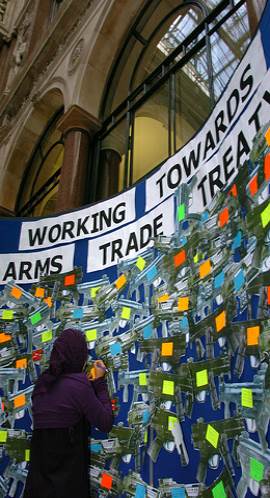
In my job I am often asked “what difference can diplomacy really make?”.
It is not always an easy question to answer. But, this week at the United Nations in New York, we should see an example of diplomacy making a real, tangible difference – and both Turkey and the UK are involved.
Today the final round of negotiations on a global Arms Trade Treaty will begin at the Arms Trade Treaty Diplomatic Conference from 18-28 March.
If successful, the new Treaty will make a big contribution to the security and prosperity of people around the world, particularly the most vulnerable.
But to be successful the negotiations will require a huge diplomatic effort. It is a top priority for the UK to secure a widely supported, robust Treaty. The British Foreign Secretary highlighted the importance of success when he said: “history will not forgive those who seek to prevent it”.
This new Treaty should:
- Save lives. A man, woman or child dies every minute as a result of armed violence. Two-thirds of these deaths are in countries not officially ‘in conflict’. Over 2 billion handguns and rifles are circulating in Africa alone.
- Promote development. Violence fuelled by unregulated or illegal weapons diverts resources from schools and healthcare. It is estimated that armed violence costs Africa some $18bn annually. That is roughly equivalent to the total aid the continent receives every year.
- Combat terrorism and crime. When terrorists benefit from easy access to weapons, they threaten the security of not only the countries where they base themselves but also their neighbours and the rest of the world.
- Reduce human suffering. Up to three-quarters of human rights abuse involves the misuse of weapons. The Treaty will oblige governments to prevent the export of arms where there is an unacceptable risk they could be used to violate human rights or international humanitarian law – as is already the case in UK law.
- Protect the legitimate arms trade. The Treaty would fully recognise a State’s right to access the arms it needs for its legitimate defence needs.
Getting to this point has not been easy. Negotiations began in June 2012. In November 2012, Turkey was one of 157 states, including the US, China and India, which voted in favour of continuing the negotiations to try and find a solution.
That is why the UK will work with Turkey and other countries to try and agree the strongest possible Treaty in the negotiations starting this week.
A successful Treaty will not solve all the world’s problems overnight. But it will offer us the chance to take a significant step forward and make a better future for millions who live in the shadow of conflict.
So, the next time I am asked what difference diplomacy can make, I hope I am able to point to the Arms Trade Treaty as an example of diplomacy in action.
